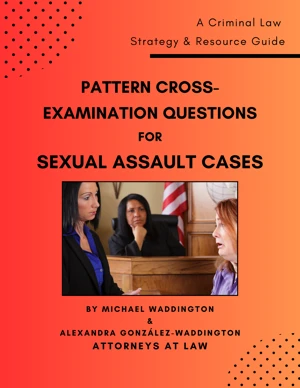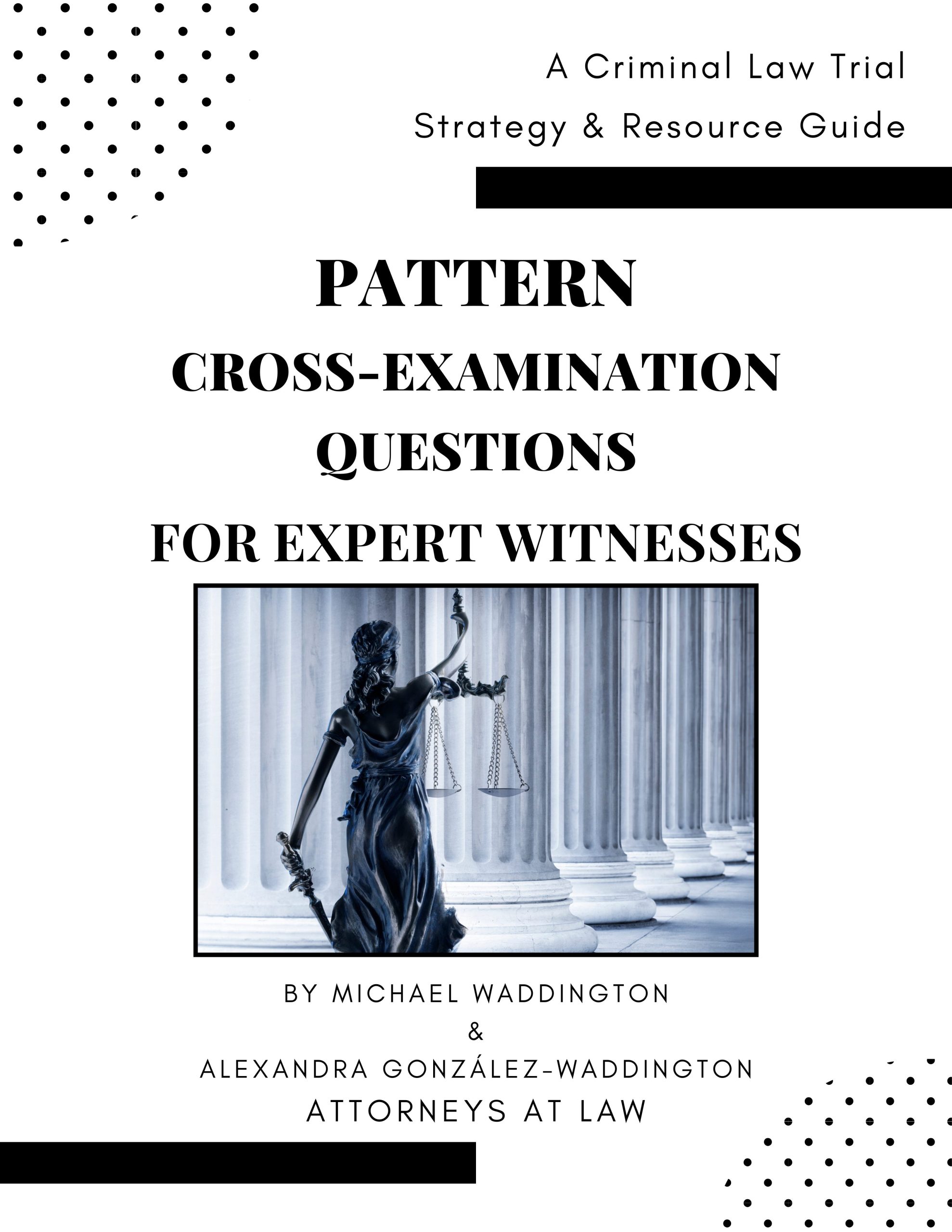Pattern Cross-Examination Questions for Sexual Assault Cases
Best-Selling, Pattern Cross-Examination Questions for Sexual Assault Cases, Returns! Republished Edition Now Available on Amazon. This book was a NACDL bestseller for seven years.
Sample Cross-Examination Questions for Sexual Assault Defense Lawyers
 In sexual assault trials, many prosecution witnesses see themselves as advocates and members of the prosecution team. Some witnesses will do whatever is necessary to win and send the defendant to prison.
In sexual assault trials, many prosecution witnesses see themselves as advocates and members of the prosecution team. Some witnesses will do whatever is necessary to win and send the defendant to prison.
This may include lying, exaggerating, and misstating facts. Pattern Cross-Examination Questions for Sexual-Assault Cases was written for criminal defense lawyers on the front lines in the war on sexual assault.
It contains pattern questions that can be used to dominate prosecution witnesses and level the playing field at trial.
This book is designed to give defense counsel cross-examination questions that can be easily modified and used in various sexual assault cases. Additionally, this book will help defense lawyers cross-examine challenging witnesses without reinventing the wheel with each new case.
It contains thousands of questions to effectively cross-examine a variety of witnesses, including the alleged victim, crime scene investigators, sexual assault forensic examiners, hostile witnesses, and more.
The cross-examination book covers various sample topics, including selective memory, victim injury, motive to lie, false allegations, false confessions, proper evidence handling, and more. Many of the questions are based on medical and law enforcement textbooks and training manuals used throughout the United States.
Includes Hundreds of Sample Cross-Examination Questions and Techniques
The cross-examination techniques and cross-examination sample questions provided serve as a starting point. Because every case is different, the cross-examiner should modify the questions based on the facts of their case. This Trial Guide is not a textbook on theories of cross-examination. Rather, it provides sample questions based on fact patterns commonly encountered in sexual assault cases.
Packed with cross-examination examples, this book will assist in the cross-examination of:
- Alleged victims
- First responders;
- Sex Assault Forensic Examiners (SAFE) / Sexual Assault Nurse Examiners (SANE);
- Law enforcement;
- Forensic lab staff;
- Evidence custodians;
- Experts in child abuse, assault, and sex crimes.
Includes Sample Cross-Examinations for:
CHAPTER 1: Dealing With Hostile Witnesses
CHAPTER 2: Cross-Examining the Alleged Victim
CHAPTER 3: Cross-Examining the Sexual Assault Forensic Examiner
CHAPTER 4: Commonly Used Sexual Assault Examiner Terms
CHAPTER 5: Cross-Examining Witnesses Regarding Forensic Evidence
CHAPTER 6: Cross-Examining Law Enforcement
CHAPTER 7: Cross-Examining Bystanders/Friends
Also by the authors: Pattern Cross-Examination for DNA and Biological Evidence
Cross-examining the prosecution’s forensic expert in a criminal trial may make the difference between victory and defeat. More and more aggressive prosecutors are relying on forensic psychiatrists, toxicologists, and other experts to help obtain convictions.
Some expert witnesses will do whatever it takes, including misapplying scientific research to bolster the prosecution’s case. For the sake of justice, defense lawyers must be able to cross-examine and nullify forensic experts effectively.
Both sides prominently used forensic experts in the second Bill Cosby trial and Harvey Weinstein’s New York trial. Counterintuitive victim behavior experts played a vital role in the prosecution’s trial strategy in these cases. This book will help defense lawyers neutralize such experts.
About the Authors:
Michael Waddington is a criminal defense lawyer who has successfully defended cases in military courtrooms worldwide, including Japan, South Korea, Germany, Iraq, Bahrain, Italy, England, and across the United States. He has been involved in some of the highest-profile court-martial cases—from the “War on Terror” to the “War on Sex Assault”—and has been reported on and quoted by hundreds of major media sources worldwide.
He is also the best-selling author of Kick-Ass Closings: A Guide to Giving the Best Closing Argument of Your Life and The Art of Trial Warfare: Winning at Trial Using Sun Tzu’s The Art of War. He has provided consultation services to CNN, 60 Minutes, ABC Nightline, the BBC, and CBS and the Golden Globe-winning TV series The Good Wife.
He appeared in a major CNN Documentary, 2009ʼs “Killings at the Canal,” and some of his cases have been the subject of books and movies, including the Academy Award Winning Documentary “Taxi to the Dark Side,” and the 2013 documentary “The Kill Team.”
Since 2013, Mr. Waddington has been an annual contributor to the American Bar Associationʼs publication, “The State of Criminal Justice.” He is also a fellow of the American Board of Criminal Lawyers (ABCL).
Alexandra González-Waddington is a founding partner of the González & Waddington Law Firm and a Georgia Registered mediator. She has represented and defended hundreds of defendants charged with sexual crimes and has worked on some of the most notorious war crime cases stemming from the Iraq and Afghanistan wars.
A former Public Defender in the State of Georgia, Alexandra has worked on various types of cases, including rapes, larcenies, and white-collar crimes. She graduated from Temple Beasley School of Law in Philadelphia, PA where she completed Templeʼs Nationally ranked Integrated Trial Advocacy Program. From 2015 through 2021, she wrote chapters in the American Bar Association (ABA) book, “The State of Criminal Justice.”
This annual publication examines major issues, trends, and significant changes in the criminal justice system and is one of the cornerstones of the ABAʼs Criminal Justice Sectionʼs work. This publication is an invaluable resource for policy-makers, academics, and criminal justice system students.
Learn the importance of cross-examination in sexual assault cases and why mastering techniques and understanding forensic, law enforcement, and medical insights are essential for justice.
The Importance of Cross-Examination in Sexual Assault Court Trials
In sexual assault court trials, cross-examination plays a critical role in ensuring a fair and just outcome. Cross-examination allows defense attorneys to scrutinize witness statements, challenge inconsistencies, and reveal potential biases. For legal professionals specializing in sexual assault cases, utilizing Pattern Cross-Examination Questions is crucial. Such questions are systematically designed to address the complex and sensitive nature of sexual assault allegations, making it possible to uphold justice and prevent wrongful convictions.
Why Cross-Examination Matters in Sexual Assault Cases
Sexual assault cases can be emotionally charged and are often based heavily on testimonial evidence. In these cases, cross-examination helps clarify the credibility and reliability of each witness. A well-conducted cross-examination allows attorneys to present the facts clearly and systematically. By using a structured approach, such as Pattern Cross-Examination Questions for Sexual Assault Cases, attorneys are better equipped to tackle issues with witness statements or to highlight inconsistencies in the alleged events.
Moreover, forensic exams often play a critical role in sexual assault cases. Attorneys who understand forensic science can effectively interpret these results, ask pertinent questions, and identify gaps or flaws in the evidence. For instance, the Sexual Assault Nurse Examiner (SANE) program, which trains healthcare professionals to conduct forensic exams for sexual assault cases, is a trusted authority in providing scientific evidence.
The Role of Science and Medical Knowledge in Cross-Examination
In cases involving sexual assault, forensic, medical, and psychological evidence is often presented to support or refute the allegations. A deep understanding of forensic and medical knowledge is required to challenge this evidence. Using Pattern Cross-Examination Questions enables attorneys to scrutinize evidence gathered from Sexual Assault Forensic Examiners (SAFE) or SANE-certified professionals. These questions can reveal inconsistencies in forensic evidence or demonstrate alternative explanations for the findings.
For instance, knowledge of physical trauma, DNA analysis, and other forensic markers can be leveraged to ask precise, focused questions. By employing Sample cross-examination questions, attorneys can dissect each element of the medical findings, possibly identifying areas where the evidence does not support the prosecution’s case. This approach is invaluable for preventing the misinterpretation of forensic evidence in court.
Resources such as the SAFE TA Center provide attorneys with detailed information on forensic best practices in sexual assault cases. Familiarity with such authoritative guidelines not only supports an attorney’s cross-examination strategy but also strengthens the defense’s credibility in questioning the validity of scientific evidence.
Leveraging Law Enforcement Knowledge in Cross-Examination
Sexual assault cases often involve law enforcement personnel as witnesses, given their role in collecting and preserving evidence. Knowledge of law enforcement procedures is essential for attorneys who want to question the accuracy and reliability of the evidence collected. Using Pattern Cross-Examination Questions for Sexual Assault Cases helps attorneys to uncover any potential procedural lapses that may compromise evidence quality.
Law enforcement officers may testify about their role in evidence gathering, witness interviews, and crime scene management. A skilled attorney can leverage Sample cross-examination questions to scrutinize these processes, exposing inconsistencies, biases, or errors in how evidence was handled. By focusing on specific procedural steps, attorneys can use cross-examination to challenge law enforcement practices, highlighting any mishandling of evidence that could impact the case.
The Power of Pattern Cross-Examination Techniques
For attorneys handling sexual assault cases, adopting a structured approach to cross-examination is invaluable. Using Pattern Cross-Examination Questions as a strategic tool allows them to prepare in advance, covering all crucial points with clarity and precision. This systematic approach can prevent surprises during trial and ensure a comprehensive defense strategy.
Furthermore, Forensic Nursing standards, as outlined by authoritative bodies like the International Association of Forensic Nurses, provide guidelines that can be invaluable in cross-examination. Questions derived from these standards help establish whether the forensic examiners followed protocol, whether any omissions were made, or if certain medical observations support alternative explanations.
Why Cross-Examination Skills Are Essential for Defense Attorneys
Sexual assault cases require a defense attorney to possess more than just general legal knowledge. In-depth expertise in forensic science, law enforcement practices, and medical procedures is essential to assess and challenge the prosecution’s evidence thoroughly. Mastery in Pattern Cross-Examination Questions for Sexual Assault Cases enables attorneys to navigate these complex cases with confidence, systematically questioning evidence and witnesses to uncover any weaknesses.
Attorneys who are adept at cross-examining expert witnesses can significantly impact the outcome of sexual assault cases. For instance, cross-examining forensic or medical professionals involves a technical understanding of scientific and medical procedures. Leveraging Sample cross-examination questions targeted at these fields can reveal critical insights that might otherwise remain unexamined.
In conclusion, cross-examination in sexual assault cases is not merely a formality; it is a critical component of the defense strategy that demands expertise, preparation, and a profound understanding of forensic, law enforcement, and medical science. With resources like Pattern Cross-Examination Questions, defense attorneys are better prepared to uphold justice and advocate effectively for their clients.



